Romani musician and instrument-maker Ferenc Ungri – by Eszter Halasi
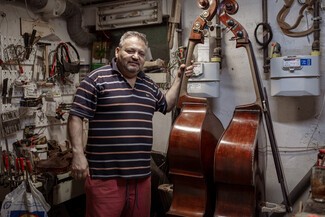
The Past, Present, and Future of Romani Music: From the Perspective of a Stringed Instrument Maker
Romani music has been an integral part of Hungary's cultural heritage for centuries. While Romani musicians have been present in almost every social corner, today, signs of the gradual disappearance of this music are evident.
Ferenc Ungri, a Romani musician and instrument maker, shares insights into these changes through his personal life journey. Ferenc Ungri comes from a musical family where the passion for music and art has been passed down through generations. "My grandparents came from a dynasty of musicians; my father, and indeed all my ancestors, were trained musicians" he shares. His father was a violist, and Ferenc began making music at the age of 12, learning the basics of folk and world music from a private teacher after five years of music school. He learned instrument making from his father, who tried to pass on his knowledge while repairing instruments.

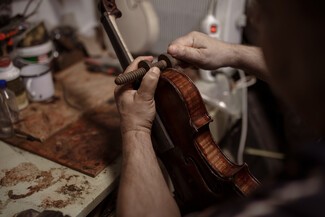

“The clarinet developed interestingly because my father didn’t want me to pursue a musical career,” Ferenc Ungri told me. "He saw that there was a dying trend among musicians and encouraged me instead to see instrument making as a profitable craft in this world. I started making music at the age of twelve, quite late; other Romani musicians started playing string instruments as early as four years old. In musician families, women do not play; neither do we, as I have three daughters, but in Romani families, men make music. My youngest daughter, Rebeka, stumbled into singing almost at thirty, but I never taught my daughters to play music. Rebeka is a Latin dancer; she has competed in dance but also excels in other artistic endeavors, such as photography and set design.”
Initially, Ferenc Ungri only dealt with repairing instruments, but later he began making his own. "I prefer repairing; restoring and breathing new life into an instrument in poor condition is a real challenge," he says. For him, instrument making and repair are not just work, but a passion that is part of his heritage. He mainly works with string instruments, despite playing on the clarinet.
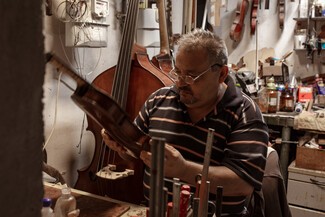
The demand for Romani music is continuously decreasing, with various reasons behind this trend. Ungri notes that Romani music programs were eliminated from the media in the early 2000s, so young people do not experience the traditional forms of music. The current state support, which provides livelihood money to 90 similar small bands, can also be seen as a political move. Ungri warns: “Let’s not deceive ourselves; this is purely a political trick, and next year there won’t be a single penny of support.”
Romani music is increasingly forgotten by the majority of society, a situation exacerbated by political and cultural oppression. Ferenc Ungri sadly notes that “the next generation will only be able to listen to Romani music through archival recordings.” His father recounted that in the year 2000, they were approached at the state level to archive rural Romani music. “This was already a conscious dismantling of Romani music back then,” Ungri states.


“The future of the 100-member Gipsy Orchestra’s successors is also in question, as talented young musicians are pursuing classical careers, where they can join well-known orchestras or start solo careers. It's understandable that they wouldn’t choose to play Romani music - who is interested in that? Where can they perform? It is almost impossible to make a living from this music. Today, 90 percent of Romani musicians work as doorman or security guards because, unfortunately, they don't have skills in other areas.”
“The 100-member Gipsy Orchestra has also changed a lot, and I wouldn’t say it has improved. Although it has been operating for 40 years and survived even during communism, it has always relied on state support, which will likely disappear sooner or later. If I had had a son, I would have advised him to have a trade that provides a stable income, with music being just a secondary hobby for him.”
Ferenc Ungri also highlights the extent to which Romungros, the majority of Romani people in Hungary, have assimilated. “Romungros have forgotten the language, and our grandparents do not speak the Romani language anymore.”
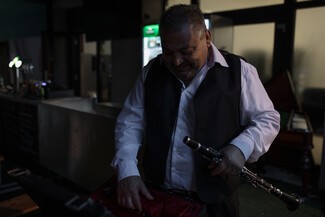

“We never spoke the language, as Maria Theresa allowed the Romani people to settle because Romani music served for their entertainment. The Romungros have forgotten how to use the language; my grandparents and great-grandparents no longer spoke the Romani language either. I was out in Germany, where I met Sinti Romani people, and they started speaking Romani, but we didn’t understand anything; they said we weren’t even Romani. The Romungros have assimilated the most here in the region; they are also called Hungarian Romani, while the Olah Romani, who speak the language and maintain the traditions, do not like the Romungros.”
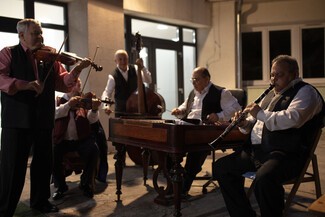
“The majority of society cannot say that we have not assimilated. After all, we no longer use our language, and slowly our musical values are fading as well; we live like Hungarians, we educate our children, and we lead the same lifestyle as anyone else in this country, only our skin is a bit darker. We have already adapted, yet I feel that as long as you have an instrument in your hand, you are liked, but as soon as you put it down, you are just as much a Roma as the others. That is why I didn’t want to impose this cultural spirit on my children or raise them in this Romani cultural environment, as I did not want them to feel the discrimination in their skin. I am glad they inherited a fair enough skin color from somewhere in the family.”
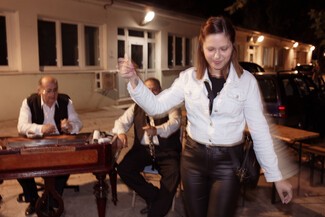
The past, present and future of Romani music are complex, diverse, and deeply rooted in Hungarian culture. Ferenc Ungri’s experiences and thoughts shed light on the fact that music is not only entertainment but also a crucial element in preserving identity and tradition.
Currently, Rebeka and her father are with Artisjus, writing pop-folk songs, and they appear on Muzsika TV, where they promote Roma music.
Words and photographs by Eszter Halasi - exclusive for the Travellers' Times